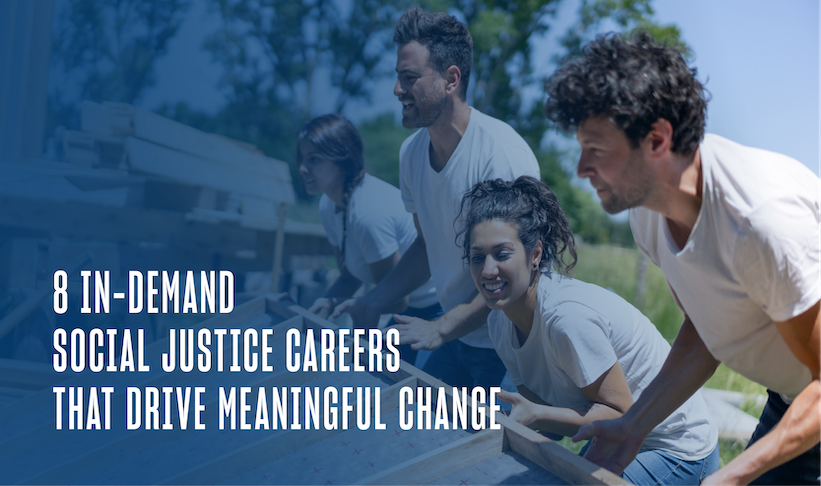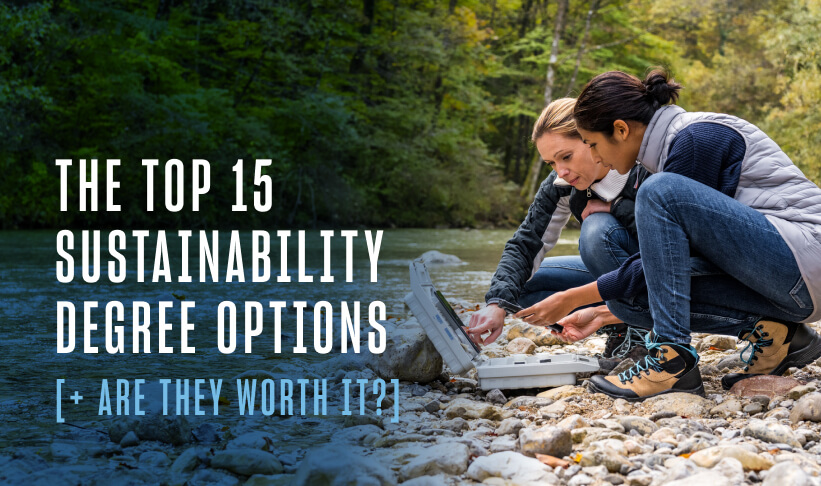If you’re interested in finding a career that can help make a positive impact on the world, you may consider pursuing a career in social justice. Whether you’d prefer to address societal issues of racism, sexism, homophobia, poverty, inequality, globalization or climate crises — working toward social justice allows you to be an agent for change and advocate for others.
If you’re ready to explore jobs in the social justice field, keep reading — and after you’ve finished, we recommend checking out our companion post: 12 Jobs That Make a Difference in the World.
What Is Social Justice?
Social justice, as defined by the United Nations’ International Forum for Social Development, is “the fair and compassionate distribution of the fruits of economic growth,” and is closely tied to the concepts of equity and economic justice. More broadly, social justice is the belief that every person, regardless of age, gender, orientation, race, religion or socioeconomic status, deserves equal access to rights and opportunities. Additionally, achieving equity to economic opportunity requires enacting “just transitions” from the status quo of inequality, discrimination, and environmental and economic exploitation.
As an ideal, social justice is a relatively recent concept, having arisen in response to the exploitation of labor during the Industrial Revolution and the push for women’s suffrage at the end of the 19th century. Over the past century, numerous movements have emerged to address injustices and promote a more equitable society.
Some of the most impactful movements include:
Industrial Labor Movements (Late 19th–Early 20th Century)
By the start of the modern era, more workers in industrializing countries began fighting for fair wages, safer working conditions and the right to organize. Key moments include the 1886 Haymarket Affair and the founding of the International Labour Organization (ILO) in 1919, which eventually won critical worker protections like the 8-hour workday and child labor laws.
First-Wave and Second-Wave Feminism (Late 19th Century–1980s)
The first wave of feminism primarily centered on legal rights for women. Achievements like the U.S. 19th Amendment (1920) and the U.K.’s Representation of the People Act (1918) marked milestones in women’s suffrage. The second wave, beginning in the 1960s, expanded feminist discourse to include issues like workplace inequality, reproductive rights and gender-based violence.
U.S. Civil Rights Movement (1954–1968)
This landmark movement sought to dismantle racial segregation and secure legal and civil protections for Black Americans. Events like the Montgomery Bus Boycott (1955), the March on Washington (1963) and the passage of the Civil Rights Act (1964) and Voting Rights Act (1965) were pushed forward by leaders such as Martin Luther King Jr., Rosa Parks, Malcolm X and Ella Baker.
Stonewall Riots and Gay Liberation (1969–1980s)
The Stonewall Riots were a spontaneous uprising against police harassment at a gay bar in New York City. This event catalyzed the modern gay liberation movement, leading to the first Pride marches and a surge of organizing across the U.S. and Europe. By the 1980s, the movement shifted to address the AIDS crisis and public health reform, and reframed queer rights as a public health and human rights issue.
The Disability Rights Movement (1970s–1980s)
The Independent Living Movement fought for the rights of people with disabilities to live in their communities rather than institutions. This led to significant legal milestones, including the passage of the Americans with Disabilities Act (ADA) in 1990, which prohibited discrimination and mandated widespread accessibility in public places.
Global Indigenous Movements (1960s–Present)
The 1968 American Indian Movement (AIM) in the U.S. challenged broken treaties, police brutality and the suppression of Native sovereignty. In Mexico, the Zapatistas declared autonomy and indigenous rights in 1994 and sought to oppose oppressive neoliberal economic policies and colonial legacies. In Canada, the Idle No More movement emerged in 2012 to resist environmental destruction and assert Indigenous governance.
The Environmental Justice Movement (1980s–Present)
The movement for environmental justice was rooted in the experiences of communities of color who were disproportionately affected by pollution and toxic waste. One of its early flashpoints was in Warren County, North Carolina, where residents protested a hazardous waste landfill being placed in a predominantly Black community. This has evolved into the global climate justice movement, which seeks to emphasize the interconnectedness of environmental degradation, colonial history and socioeconomic inequality.
Third-Wave and Intersectional Feminism (1990s–Present)
Modern feminism attempts to acknowledge how race, class, sexuality and disability intersect with gender. This wave built upon the work of scholars like Kimberlé Crenshaw, who coined the term intersectionality, and thinkers such as bell hooks, who challenged mainstream white feminism to confront deeper systems of oppression. Today’s movement continues to push boundaries, addressing issues like bodily autonomy, LGBTQ+ rights and the decolonization of gender.
Marriage Equality and Trans Rights Movements (2000s–Present)
The modern LGBTQ+ movement arose from battles for marriage equality, transgender rights and protections for queer youth. The landmark U.S. Supreme Court ruling in Obergefell v. Hodges finally legalized same-sex marriage in 2015. However, systemic challenges remain, particularly for trans people, queer people of color and LGBTQ+ communities in areas where being queer is still criminalized or culturally suppressed.
Black Lives Matter (2013–Present)
Founded in 2013 following the killing of Trayvon Martin, BLM reignited global conversations about systemic racism, police brutality and mass incarceration. Its resurgence in 2020, following the murder of George Floyd in Minneapolis, Minnesota, marked one of the largest global protest movements in history and a push for racial equality and justice that continues to this day.
If you’re thinking of doing social justice work, know that you’re following in a long line of activists, organizers, faith leaders, heroes and philosophers. Achieving social justice for the global community will require continuing this work and offering your support across many different areas of society.
What Are the Areas of Social Justice?
There are far too many areas for any one person or single organization to address. It is more effective to focus on working within a specific aspect to promote the values of social justice, especially as these areas are interrelated. For example, improving access to education can have positive impacts on a community’s access to health and business opportunities, which in turn can help to alleviate poverty.
No matter your calling or passion, you’re doing work that helps to reinforce human dignity and create a better world for all. Consider any of the following areas as possible social justice career options.
- Education Justice – Education is a foundational human right and a powerful tool for empowerment, yet many still face unequal access to quality education. Education justice means more than closing the achievement gap; it demands equitable funding, inclusive curricula and culturally competent teaching. Social justice practitioners in this field work to ensure that every learner, regardless of background, has the resources, safety and support they need to succeed — from early childhood through higher education and vocational training.
- Business and Economic Justice – Economic justice challenges systems that perpetuate inequality, labor exploitation and wealth gaps. It envisions fair wages, dignified working conditions, inclusive hiring practices and shared ownership models that return profits to workers and communities. Social justice advocates can drive change by promoting cooperative economies, supporting worker unions, developing community wealth-building initiatives, and advancing equitable access to capital for underrepresented entrepreneurs. In practice, this also means confronting poverty through public policy, social safety nets and targeted investment in historically excluded communities.
- Criminal and Legal Justice – The criminal legal system often disproportionately targets Black, Indigenous and other marginalized communities through over-policing, mass incarceration and sentencing disparities. Criminal and legal justice efforts seek to reform or dismantle these harmful systems and replace them with restorative, rehabilitative and community-centered alternatives. Advocates work on everything from public defense and bail reform to re-entry support and the decriminalization of poverty.
- Food and Water Justice – Access to nutritious food and clean water is a basic human right, yet food deserts, contaminated water systems and inequitable agricultural practices leave millions without adequate nourishment or hydration. Food and water justice focuses on dismantling the racial, economic and geographic disparities that govern who gets to eat well and drink safely. Practitioners may work in areas such as urban farming, Indigenous food sovereignty, community-led water monitoring or policy advocacy for sustainable food systems.
- Racial Justice – Racial justice is about dismantling the systems, policies and ideologies that perpetuate racial inequality and white supremacy. It moves beyond non-discrimination to focus on reparative, transformative action, including equitable hiring, access to housing and education, cultural representation and the redistribution of power and resources. Whether working in law, health care, education, tech or the arts, social justice professionals must recognize and address how racism manifests in their fields and partner with communities to drive antiracist change.
- Gender and Sexuality Justice – Gender and sexuality justice seeks to ensure that all people, regardless of gender identity, expression or sexual orientation, can live with full rights and opportunities. This includes dismantling patriarchal systems, fighting gender-based violence, protecting trans rights and affirming reproductive freedom. Advocates work in a variety of settings: gender-responsive policy-making, LGBTQ+ health care, queer youth programs, trans legal defense and feminist design and media. Intersectionality is central to this work, acknowledging that gender and sexuality cannot be separated from race, class and other identities.
- Immigration and Refugee Services – Migrants, asylum seekers and displaced people face not only the trauma of relocation but also legal obstacles, xenophobic policies and systemic neglect. Immigration and refugee justice means advocating for humane immigration systems, pathways to citizenship, safe housing, fair labor rights and access to services. Social justice workers in this field may provide legal assistance, policy advocacy, language support, trauma-informed care or community organizing to help build inclusive and resilient immigrant communities.
Despite how immigrants are often negatively portrayed by the media and politicians, even The U.S. Congress recognizes that working to assist immigrants and refugees brings positive benefits, which include creating new businesses, driving economic growth and helping to build communities.
- Environmental Justice – Environmental harms disproportionately affect low-income communities, Indigenous nations and communities of color. Environmental justice connects ecological protection to human rights, emphasizing that all people deserve clean air, safe water, healthy land and resilience in the face of climate change. Careers in this area span climate policy, Indigenous land defense, renewable energy equity, urban greening, disaster preparedness and environmental health research.
- Health Justice – Access to health care is established as a basic human right, but in reality, systemic barriers leave many communities without adequate care. Health justice involves removing these barriers and ensuring that health systems are culturally competent, affordable, accessible and equitable. Public health professionals, nurses, community organizers and mental health workers play essential roles in advocating for universal care and fighting disparities based on race, gender, ability and immigration status.
- Violence Prevention and Victim Advocacy – Violence — whether domestic, sexual, state-sanctioned or community-based — disproportionately harms those already marginalized. Violence prevention and victim advocacy focus on interrupting cycles of violence, supporting survivors and transforming the conditions that allow harm to occur. This includes working on trauma-informed care, anti-violence education, housing for survivors, transformative justice processes and crisis response. Advocates support victims not only in healing but also in reclaiming agency and accessing justice without reproducing the harms of punitive systems.
8 Careers in Social Justice
If you’re hoping to promote equality and justice in your career, there are some paths that are explicitly dedicated toward promoting public good and social equality. The following are eight social justice career options where you can specialize in areas that will help to make a difference.
- Instructional Coordinator — Teaching and education is a broad field, and encompasses everything from elementary and high school positions to adult education and postsecondary positions at colleges and universities. While all of these careers can benefit the cause of social justice, one we’d like to highlight is the instructional coordinator position. While instructional coordinators aren’t active in the classroom, they’re responsible for developing curriculum, planning and conducting teacher training, researching and recommending new instructional techniques, standards and assessments. It’s an important position that can help determine what is taught as well as how schools and institutions can better address matters of discrimination.
- Instructional coordinators have a median salary of $74,720.
- This position requires a master’s degree in education or related field and a few years of work experience. Those who work in public schools will need to have a state-issued license.
- Social Worker — Social workers are on the frontlines in assisting and supporting the most vulnerable members of society. They can specialize in working with children, the homeless, those under the poverty line, the unemployed or those struggling with terminal illness, mental illness or addictions. They can work directly with individuals who are in-need or at a larger level to develop policy and push for the development and/or improvement of social programs and services.
- Social workers have a median salary of $61,330.
- This position requires either a bachelor’s or master’s degree in social work. Clinical social workers will need to have a state-issued license.
- Urban Planner — Urban and regional planners play a vital role in analyzing and approving land use and development plans. Ideally, urban planners will work toward improving a community by consulting with public officials, community advocates, planning commissions and neighborhood groups. They can further the cause of social justice by ensuring that marginalized and underserved communities are treated equitably when it comes to the planning of transportation, housing, infrastructure and public places — rather than being the target for predatory gentrification.
- Urban planners have a median salary of $83,720.
- This position requires a master’s degree in urban or regional planning. Some positions will also work experience or certain certifications.
- Social and Community Service Manager — Public administration is a very broad field of careers that work in state, local and federal governments to administer aid, support and services to the public. There are positions in public housing, criminal justice, health services and emergency management. One of the more central positions, social and community service manager, oversees programs and organizations that work to support the well-being of the public. They may focus on larger communities or specialize in specific areas like veteran’s care, homelessness or child support and education.
- Social and community service managers have a median salary of $78,240.
- This position requires a bachelor’s or master’s degree in social work or a public policy-related field. Some work experience may also be required.
- Public Health Nurse — The field of public health serves and administers to the general public, rather than in private practice for individuals. While there are many possible positions for those interested in working in public health, the most popular tend to be health education and community health workers, biostatisticians and public health nurses. Public health nurses don’t focus on bedside care, but rather travel to communities in order to educate people about health issues, provide access to healthcare services and identify any risk factors unique to certain communities or vulnerable populations.
- Public health nurses have a median salary of $93,600.
- This position requires a bachelor’s or associate’s degree in nursing. They must have a state-issued nursing license and some positions may require work experience.
- Emergency Management Director — Those in the field of emergency management prepare and plan for responding to natural disasters or other public emergencies. Those who lead the response, emergency management directors, coordinate with government agencies, nonprofit organizations, private companies and communicate with the general public to set response plans and take action in the event of an emergency. Directors will oversee training and run exercises to ensure preparedness and will direct operations from a localized command center during a public emergency.
- Emergency management directors have a median salary of $86,130.
- This position requires at least a bachelor’s degree and years of experience in an emergency management field (exact required amount may vary on the position).
- Engineer — Engineers of all fields can work toward social justice, including civil, biomedical, industrial, mechanical and chemical. Organizations like the Engineering, Social Justice and Peace (ESJP) network brings together a global community of academics, students, professionals and community groups to use engineering to enhance social and environmental justice. Some engineering fields, such as environmental engineering, work explicitly to develop solutions for the world’s pressing environmental problems.
- Environmental engineers have a median salary of $104,170.
- This position requires at least a bachelor’s degree in an engineering field, with higher level and leadership positions requiring a master’s degree and several years of work experience.
- Epidemiologist — An epidemiologist is a public health worker who specifically researches and directs studies on diseases and similar community health risks. They work to analyze patterns of outbreaks or public health issues in order to determine effective means of mitigating harm, aiding in recovery and preventing future outbreaks.
- Epidemiologists have a median salary of $83,980.
- This position requires at least a master’s degree in a field related to public health.
Pros and Cons of a Social Justice Career
If you’re determined to make a difference, then you should understand that you’re working toward a long-term benefit. Promoting social justice will help improve human society for the better over time. In the short term, it can elevate and celebrate local communities, making them healthier and more vibrant places to live. Achieving social justice can be personally rewarding, allowing you to take pride in your work and efforts.
There are some considerations about engaging in this work. It can be challenging, not just in the obstacles you’ll face, but also in the physical, mental and emotional toll that comes with working alongside those who are most in-need of assistance.
Working toward social justice can also bring unintended consequences — think of the negative effects of gentrification, where working to revitalize a community attracts outside investors who purchase property, eventually pricing out the original inhabitants. Social justice work needs to be a coordinated collaboration with other stakeholders, government officials and representatives of local communities to ensure that outcomes are equitable and all possible harms are mitigated.
Finally, there’s misinformation and fear-mongering about the aims of social justice work, that it’s merely performative or has ulterior motives. To work in social justice means that you’ll need to educate others about your goals, about the process of achieving equity and about the individuals and communities you’re working for.
| Pros | Cons |
| Important for better societies | Challenging |
| Celebrates communities | Unintended consequences |
| Personally rewarding | Can be misunderstood |
How to Start a Career in Social Justice
If you’re interested in pursuing a career in social justice, understand that this field is dynamic and interdisciplinary. No two paths will likely look the same, and there are many opportunities — local, national and global — that can lead to the type of social justice work you want to be doing.
- Identify Your Core Values and Interests
Begin by reflecting on the social issues that most compel you. Are you moved to address racial justice, environmental equity, gender rights, global health or refugee support? Understanding what you’re most passionate about can push you toward specific social justice movements and organizations.
Also, consider your strengths: Are you more analytical or hands-on? Are you policy-focused or a builder of systems? Are you an effective communicator or organizer? Knowing what you’re good at will identify the type of social justice jobs you can excel at. - Gain Ground-Level Experience
The experience of being part of a community is foundational to social justice. Even if your goal is to work at an international level, start by volunteering or interning with grassroots organizations, mutual aid groups, community health clinics or advocacy campaigns in your area.
See how you can participate in local initiatives, attend town halls, join environmental cleanups or support housing coalitions. The more you’re able to work within your local communities or institutions to advocate for inclusive practices or policy changes, the greater understanding you’ll have about how to listen to, collaborate with and motivate others. - Research Different Organizations and Movements
Explore organizations, NGOs, nonprofits, mutual aid networks and advocacy groups that are already doing the work you’re passionate about. Pay close attention to their mission statements, leadership structures and how they partner with impacted communities. Follow them on social media, attend public events and read their reports for insight into their values and effectiveness.
Seek out books, podcasts and media produced by people within those movements as well. This helps you approach social justice work with humility, context and respect for the communities leading the charge. Thoughtful research not only sharpens your understanding but also helps you build authentic connections and avoid unintentionally reproducing harm. - Earn Relevant Certifications and Academic Degrees
While lived experience and community engagement are essential, formal education can deepen your understanding of systems, policy and theory. Education will also help you develop the tools to advocate effectively across professional settings. Degrees in fields like social work, public health, law, environmental studies, sociology or international development often include tracks or concentrations in social justice.
Short-term certifications and online courses can be powerful ways to build skills and show commitment to justice-oriented work. These credentials can make you more competitive for roles in both grassroots and institutional settings, while also helping you stay current with evolving best practices. Many universities offer interdisciplinary programs and certifications that help prepare you for work across advocacy, research, policy and frontline services. - Explore Networking Opportunities Within Social Justice Fields
Networking in social justice often looks different than in traditional professions. Instead of focusing only on professional titles or formal connections, begin by getting involved with communities and causes. Attend public events, town halls, workshops and protests. Join local coalitions, advocacy groups or student organizations that align with your interests. These spaces are where you’ll meet others who share your values, and where relationships are often rooted in shared purpose rather than personal gain.
You can also expand your network through conferences, fellowships, online communities and mentorship programs that center justice and equity. Many national and global organizations offer opportunities to connect through events or affinity groups. Platforms like LinkedIn, Slack and even Instagram or TikTok host active communities of organizers, artists, academics and practitioners sharing insights and opportunities.
Consider the following organizations as good places to start:
- Amnesty International
- CARE International
- Engineering, Social Justice and Peace (ESJP)
- Engineers Without Borders
- International Federation of Red Cross and Red Crescent Societies (IFRC)
- JASS: Just Associates
- National Association of Social Workers (NASW)
- Race Forward
- Society for Public Health Education (SOPHE)
- The American Public Health Association
- Urban Justice Center
Should You Choose a Career in Social Justice?
If you believe in positive change and are looking for a career that can be fulfilling and impactful, then the world of social justice might be right for you. If you feel strongly about making a positive impact, you can also make social justice a central part of whatever position you choose, even if you don’t pursue a “typical” social justice career.
Because the world’s problems do not stop at disciplinary boundaries, the University of San Diego has created the Master of Science in Engineering for Sustainability and Health (MESH) degree program to empower those looking to enact positive social change.
“Understanding the relationship between healthcare and the economy, the environment, justice, social factors, all of these aspects of our life are interconnected…so a program like MESH is so important to bring into the world this cross disciplinary training that is the foundation of our world as it needs to be understood. This understanding is really at the forefront”
Dr. Susan Abookire, WIF fund launch.
MESH Director and Co-founder of ESJP, Dr. Caroline Baillie, has spent her career promoting the cause of social justice in engineering. That’s why our curriculum is built on a purposeful and critical transdisciplinary practice that incorporates complex system approaches to sustainability and health.
If you’d like to know more about either the MESH degree or the ESJP program, contact us to continue the conversation.




